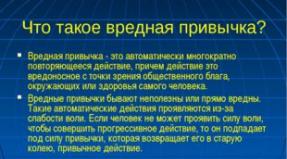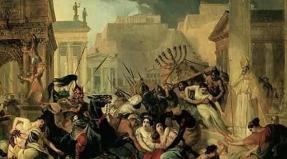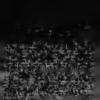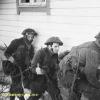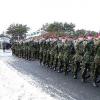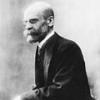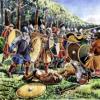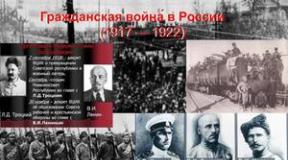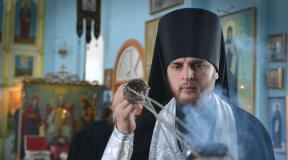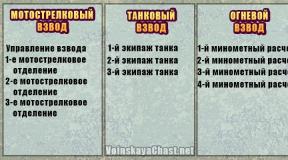Otrepiev grigory. How did the swindler Grishka Otrepiev become False Dmitry? The emergence of a new force
Recognized by his mother, boyars and people and became the Russian tsar. Later, the same mother and the same boyars renounced him and began to call him no longer the tsar's son, but the stripping and heretic Grigory Otrepiev. When were they sincere? When did they begin to kiss the dusty boots of the "king's son" and crawl on their knees in front of him, seeking favors, or when, not having received the desired favors, kicked the disfigured corpse of the "uncut" and spat on him publicly?
Who was this man, who remained a mystery forever. The official historiography, confused by the contradictions, considers him a fugitive monk from the Galician noblemen, Grigory Otrepiev.
The investigation into the "murder of Tsarevich Dmitry" cannot be considered a reliable source in any way, because the investigator, Prince Vasily Ivanovich Shuisky, who later became Tsar Vasily IV, twice retracted the conclusions made by the investigation under his leadership, and twice denounced yourself in the wrong production of this effect.
The first time he recognized the impostor Grigory Otrepiev as the real Dmitry, thereby canceling out even the very fact of the death of the Tsarevich, for the second time, having already overthrown and killed the named Dmitry, he declared that the real Tsarevich Dmitry was killed by order, and did not kill himself in a fit of epilepsy , according to the findings of the investigation. There is no doubt that Shuisky knew the truth better than anyone else, but which of his three testimonies can be considered true, and which two are lies?
Three versions of Shuisky
So, the "three versions of Shuisky" formed the basis for further historical research about the personality of Tsar Dmitry Ivanovich, and all historians of subsequent times have already built their studies based on a version convenient for themselves, relying on their own views and preferences, or frankly getting confused in all three versions.
“The question of the guilt of Boris Godunov in this death was submitted more than once to the archives unresolved, and was again pulled out by hunters to solve it in favor of Boris. Nobody succeeded ... ”- wrote N. Kostomarov.
... The son of Ivan the Terrible and Maria Feodorovna Naga (this was the 7th marriage of the tsar, which was concluded without church permission) was born in Moscow on October 19, 1583. His first name was Uar, in honor of the holy martyr Uar, whose memory is celebrated by the Orthodox Church 19 October. At the baptism, the baby was named Dmitry.
Six months later, Ivan the Terrible died. In his dying orders, he bequeathed the city of Uglich to Dmitry and his mother and entrusted the upbringing of the prince to his favorite boyar Bogdan Yakovlevich Volsky.
The cunning Volsky was disliked in boyar circles and was seriously afraid that a clever intrigue in alliance with the relatives of the prince, the Nagi, would not want to start a confusion, declaring Dmitry to be the heir of Ivan the Terrible. Therefore, already on the very first night after the death of the tsar, the widow-queen with the young tsarevich, her father, brothers and close relatives, accompanied by numerous stewards, solicitors, servants and an honorary streltsy escort, was solemnly escorted to Uglich - in fact, into exile.
However, the tsarevich did not cease to remain a constant factor in Russian domestic politics, which was impossible to ignore. The reigning Tsar Fedor did not have offspring, and the question of succession to the throne, not without reason, bothered the minds. In Moscow there were several very, very ambitious personalities who mentally were already trying on the coveted hat of Monomakh. And one of such personalities was the energetic close boyar of the tsar Boris Godunov.
Meanwhile, the last Rurikovich was growing up in Uglich. Apparently, we will never be able to find out about the true character traits of the young tsarevich, since Moscow, not seeing and not knowing Dmitry, could only judge him by rumors, sometimes deliberately disseminated by supporters of one or another boyar party. Some said that, already 6 or 7 years old, the boy was an exact copy of his fanatical father: he loves to torture and kill animals, he loves blood and sadistic fun.
It was claimed that once in winter, while playing with children, Dmitry ordered to sculpt 20 human figures out of snow, named each after one of the first boyars and enthusiastically chopped these figures with a saber, while "Boris Godunov" he cut off the head, others - hands and legs, while saying: "This is how you all will be in my reign!" This, of course, is obvious nonsense, and it is rather strange that it is sometimes taken seriously to this day. I hardly believe in the possibility of a 6-year-old child showing such speculative hatred for people he never knew or saw, and it is unlikely that young Dmitry, living in Uglich, could know the names of the Moscow boyars.
Opposite rumors showed Dmitry as a "sovereign youth." They said that the young prince showed intelligence and qualities worthy of a king. Be that as it may, one thing undoubtedly seems important: in Moscow, no one, absolutely no one knew Tsarevich Dmitry and could not say anything reliable about him.
Boris Godunov, eaten up by the thirst for power, did not stop thinking about how to get rid of the growing heir to the throne. According to Karamzin, "this greedy power-hungry man saw between himself and the throne one unarmed infant, as a greedy lion sees a lamb!" And so the "greedy power-hungry" planned a terrible, bloody business: he planned the murder of the prince ...
Boris revealed his plans to his close associates: all of them, except for the butler, Grigory Godunov, decided that Dmitry's death was necessary from the point of view of the state good. At first, the poison was chosen, which the bribed mother of the prince, Vasilisa Volokhova, secretly poured into his "food and drink." However, the deadly potion for some reason did not harm the prince.
Then they decided to kill Dmitry. The first two nobles chosen for this delicate matter, Vladimir Zagryazhsky and Nikifor Chepchugov, flatly refused such an offer and "from now on were persecuted." They found another, clerk Mikhail Bityagovsky, judging by the description - downright Herod, "marked on his face with the imprint of atrocities, so that his wild appearance vouched for loyalty in evil." If you, the reader, were offered such a character to look after your household, would you be at least a little alarmed? But it was this Herod who was sent to Uglich to rule the household of the dowager queen, to oversee the servants and at the table ...
Together with Bityagovsky, his son Danila and nephew Nikita Kachalov arrived in Uglich. There they were already awaited by the bribed Volokhova, the mother of the tsarevich, and her son Osip, also initiated into the circumstances of the impending assassination attempt.
1591, May 15 - on Saturday, at six o'clock in the afternoon, the queen and her son returned from church and were preparing to dine. The servants were already carrying food, when suddenly, it is not clear why, Volokhova's mother called Dmitry for a walk in the yard. The queen was supposedly going to go with them, but hesitated. The nurse did not let the Tsarevich go, but Volokhova, by force (!), Took Dmitry, together with the nurse, out of the upper room into the hallway and to the lower porch. Here Osip Volokhov, Danila Bityagovsky and Nikita Kachalov appeared before them. Volokhov, taking
Dmitry's hand, said ominously:
“Sovereign! You have a new necklace! "
"No, the old ...", - the prince answered with a trusting smile.
Volokhov pulled out a knife and tried to hit Dmitry in the neck, but the knife fell out of his hands. Screaming in fright, the nurse hugged her pet, but Danila Bityagovsky and Nikita Kachalov snatched the child from the woman's hands and cold-bloodedly stabbed him to death. Throwing away the agonizing prince, they rushed to run. Just at that time the queen came out onto the porch ...
A few minutes later, the silence of the city was broken by the booming sounds of the alarm: the sexton of the Transfiguration Cathedral, who was in the bell tower and became an unwitting eyewitness to the tragedy, called the people. The townspeople ran to the palace and saw the lifeless body of Dmitry and the queen and the nurse, beating in hysterics. Somewhere nearby were the killers who tried to hide in the discharge hut. They were captured and killed.
Mikhail Bityagovsky appeared on the porch, shouting that Dmitry had stabbed himself in a fit of epilepsy; they threw stones at him, overtook him and killed him along with a certain "slave" of him, Danila Tretyakov. They killed both the servants of Mikhail, and some bourgeois who turned up by the arm, and the "foolish little wife" who lived with the Bityagovskys, only mother Volokhova was left alive to "testify" ...
For what reason did the "people's anger" exterminate the main conspirators, sparing Volokhova - what kind of "testimony" could she give? How long did the townspeople take to find and kill the murderers? Why didn't the killers have time to hide? Perhaps because they did not try? Didn't they try because they weren't killers and didn't feel any guilt behind themselves?
The murder investigation commission concluded that Dmitry “stabbed himself”, having cut himself with a knife in a seizure of epilepsy. Of the interrogated relatives of the tsarina, Mikhail Nagoy claimed that the tsarevich had been stabbed to death; Grigory Nagoy testified that the child had wounded himself while playing with a knife at the "poke"; Andrei Nagoy said that he had not seen any killers and did not know who could have done it. Tsarevich's nanny Vasilisa Volokhova described how, in a fit of epilepsy, Dmitry "was thrown on the ground, and then the prince stabbed himself in the throat with a knife."
And 14 years later, when the Moscow throne was already occupied by the imaginary Dmitry, Vasily Shuisky, who in 1591 headed the commission of inquiry and, like no one who knew the true circumstances of the case, threw in his hearts: “Damn, this is not a real prince; you yourself know that Boris Godunov ordered to kill the real tsarevich. "
So suicide or murder?
... Having considered the results of the investigation, the Boyar Duma decided that "the fate of the tsarevich was in God's hands, and His will was for everything." The protocols of the investigation, however, remained a secret for most of his contemporaries, and the people knew only about the death of the tsarevich - unexpected and inexplicable.
There is also an episode in the Uglich tragedy that remained difficult for most historians to explain. At midnight after the fateful date in Yaroslavl, the brother of the dowager queen Athanasius Nagoy, who lived in exile in Yaroslavl, appeared at the gate of the Englishman Horsey's house. Nagoy, who came out to knock, informed Gorsey that at about six o'clock in the afternoon the "clerks" had cut his throat, and Boris Godunov had taught them to do this atrocity. The naked added that Queen Mary was poisoned or spoiled, and asked to quickly give him some remedy. Horsey gave him some kind of balm. And in the morning all of Yaroslavl knew about Dmitry's death and that Boris Godunov was behind the killers.
Afanasy Nagoy was not in Uglich on the day of the murder, and the detective commission did not even involve him in the interrogation as a witness. How did he know all the details of what had happened six hours later? Probably from someone who urgently came from Uglich. But was it not with this mysterious messenger ... the wounded or exhausted dear Tsarevich Dmitry, for the sake of whose salvation Athanasius Nagoy asked for a healing balm from Horsey in the middle of the night?
Despite the conclusion of the commission of inquiry, the version of Nagikh that the prince was killed on the orders of Godunov prevailed in public opinion. All over Moscow they secretly whispered that Godunov had arranged everything. They talked about Godunov's "treason" and about his intention to take over the throne. To silence these whisperers, the government carried out mass executions of the inhabitants of Uglich (about 200 people died). The naked were sent to prison, and Queen Mary was tonsured into a nun ...
The rumor that the tsarevich was alive began immediately after the death of Tsar Fyodor Ioannovich. It was rumored that in Smolensk they saw some letters from Dmitry. The Frenchman Yakov Margeret wrote in 1600 that “some consider Dmitry Ivanovich alive”.
A wave of new rumors about the rescue of the Tsarevich was caused by the "case of the Romanov boyars." Historians associate this wave with the activities of the Romanovs, who, wishing to overthrow Godunov, prepared for him to replace an "impostor." Meanwhile, it was among the servants of the Romanovs that a certain Yuri Otrepiev was noticed ...
A certain Grigory Otrepiev
... 1604, October 16 - a small detachment of a mercenary army entered the Moscow state, led by a man who was called the legal heir to the Russian throne, Tsarevich Dmitry Ivanovich, who had escaped death. The frightened authorities published at once two (!) Strikingly different versions of the fact that the alleged Dmitry is a certain Grigory Otrepiev, a fugitive defrocked monk.
Yes, Grigory Otrepiev was in fact surrounded by the newly-minted tsarevich. 1605, February 26 - the Jesuits who were with Dmitry in Putivl wrote: "Grigory Otrepiev, a sorcerer and libertine known throughout Muscovy, was brought here ... And it became clear to the Russian people that Dmitry Ivanovich was not at all like Grishka Otrepiev."
Otrepiev was shown in Putivl "in front of everyone, clearly exposing the lie to Borisov." Otrepiev was also seen in Moscow, after which Dmitry removed him to Yaroslavl, where his traces were lost. Later, the prevailing point of view was that it was "False Trep", but in fact - a fugitive monk Leonid. There are a lot of fugitive monks in this whole story with the same biographies and all kinds of "False" ...
The unexpected death of Boris Godunov opened the way for Dmitry to the capital. Moscow greeted him with enthusiasm for the acquisition of the true sovereign. Anointed to the throne by the Patriarch of Moscow and All Russia Job under the name of Tsar Dmitry Ivanovich, this Tsar caused surprise and fear among his contemporaries and continues to arouse the genuine curiosity of historians.
No impostor in world history has enjoyed such support. The people sincerely loved Dmitry and were ready to punish his enemies more strictly than any supreme power. If someone dared to call the tsar "fake", then, in the words of a contemporary, "he disappeared: be he a monk or a layman, they will now be killed or drowned."
The breadth of Dmitry's views, his inner freedom and religious tolerance could not but cause fear among the zealots of fatherly antiquity. “We have only one ritual, and their meaning is hidden,” he said to the Moscow Orthodox clergy. - You deliver piety only by keeping your posts, worshiping relics, honoring icons, but you have no idea about the essence of faith. You call yourself the new Israel, you consider yourself the most righteous people in the world, but you do not live like a Christian at all: you love each other a little, you are little disposed to do good. "
The "non-royal" behavior of the new tsar, his strange quirks for "splendid" Moscow, were also surprising and frightening. In front of his palace, Dmitry put a statue of a copper Cerberus with three heads - a "hellish guard", whose three jaws could open and close, while making a clattering sound. This, in fact, an amusing quirk greatly frightened God-fearing Muscovites: scary! In winter, by order of the tsar, an ice fortress was erected on the ice of the Moskva River for military fun, depicting Azov. On its walls were painted with images of monsters, symbolizing the Tatar power. The people of Moscow were frightened of these monsters too: they painfully resembled devils!
And there is nothing surprising that the program of "popular protest" against the "rotten" tsar organized by the boyar elite aroused some sympathy among the people. The boyars emphasized in every possible way that “Dmitry is a foul tsar: he does not honor holy icons, does not like piety, eats vile dishes, goes to church unclean, right from the“ bad bed ”, has never washed in a bath with his“ filthy queen ”. Without a doubt, he is "not of royal blood."
For medieval thinking (and it has been completely intact to this day) there is nothing more unbearable than an encounter with a phenomenon that does not fit into the framework of its own ideas. Then supernatural forces are invariably invoked to explain this phenomenon. In the 17th century, it was about heresy and witchcraft, in our time - about zombies and magic (that is, about the same witchcraft). Therefore, it is not surprising that the boyar opposition began to accuse the tsar of being a warlock, a sorcerer and a heretic who had entered into an alliance with evil spirits.
This rumor caused a lot of rumors among the people. Some believed that False Dmitry was an extraordinary person, others called him an accomplice of the devil. The many talents of False Dmitry, recognized even by his enemies, tried to explain by the fact that as a teenager young Grigory Otrepiev entered into an alliance with Satan: "This young man is still more skilled in the Black Book ... The letter was not given to him from God, but to the devil learn a vessel."
Rumors that the imaginary Tsarevich Dmitry was a heretic and a warlock began to spread back in 1604, when the defrocked had just begun its campaign against Moscow. It was said that, having fled to Poland, the monk Grishka Otrepiev turned there into a black book and "an angelic image more overpowering and swearing, and, by the action of the enemy, deviated greatly from God." In fact, there is information that, while in the Ukraine, in Goscha, Grigory Otrepiev accepted the Arian heresy and studied with one of the preachers of Arianism Matthew Tverdokhleb. By the way, the activities of the Arians in Ukraine aroused the anger of the Polish Catholic Church.
“In Poland he sold his soul to demons and wrote them a handwriting in blood,” they said in Moscow. "The demons promised to make him king, and he promised them to give up on God."
“But isn't he himself a demon? Others asked. "He appeared in human form in order to embarrass Christians and make a toy for himself with those who fall away from the Christian faith." Still others assured that Grigory Otrepiev was a dead man who rose from the grave, who once lived, and then died and revived by demonic power on the mountain of Christianity (in modern language - zombies).
Many later, from the historical memory of the people, songs were composed about Grishka the blasphemer, who swears at Orthodox shrines:
And lay local icons for themselves,
And he puts chudny crosses under his heels.
In another song, the sorcerer Grishka makes magic wings for himself, on which he tries to fly away from the crowd that burst into the royal palace:
And I will do the devil's porch,
I will fly away with the devil!
“There was Grishka-haircut, nicknamed Otrepkin,” many years later told the people. - He went at midnight on the ice under the Moskvoretsky bridge and wanted to drown himself in the wormwood. And here the crafty one comes to him and says: “Don't drown yourself, Grishka, you'd better surrender to me! You will have fun in the world. I can give you a lot of gold and silver and make you a great man! " Grishka and says to him: "Make me king in Moscow!" “Please! Only you give me your soul and write the contract in blood! " In this way, according to legend, Grigory Otrepiev obtained the Moscow throne for himself.
1606, May 17 - the imaginary Dmitry Otrepiev was killed by conspirators. The boyars and their supporters who burst into the palace found a buffoonish mask in the tsar's chambers, which immediately grew in the eyes of the murderers to the size of a state crime: "This very hara, this idol, was worshiped by the sorcerer and heretic Grishka Otrepiev, and not the true God!" They threw the mask on the ripped belly of False Dmitry 1. They mocked his body for a long time and, in the end, buried him “in a wretched house” (in a cemetery for the poor and homeless) outside the Serpukhov Gate, near the main road.
On the day when the body of the former tsar, tied to a horse, was dragged to the Serpukhov Gate, a terrible storm swept through Moscow, the roof of the tower was ripped off on Kulish and the wooden wall at the Kaluga Gate collapsed. They immediately recalled that the same storm had occurred during the solemn entry of False Dmitry 1 into Moscow ...
In the "squalid house" the body of the deceased was transported by invisible force from place to place, and many saw two doves sitting on it. Someone saw blue lights rising from the ground over the grave of the defrocked Grigory Otrepiev. Then the body was allegedly ordered to be buried deeper into the ground, but suddenly the body of the murdered king was a quarter of a mile from the "wretched house."
In addition, rumors spread around Moscow that at night the dead man gets up from the grave and walks. They immediately recalled that the Lapps, residents of northern Lapland, who bowed to Tsar Dmitry with an annual tribute, had recently come to Moscow. From time immemorial, the Laplanders were rumored as wizards who even knew how to resurrect the dead: "they are told to kill themselves, and then they come to life." Only Grishka Otrepiev learned this hellish art from Lapland sorcerers-Hyperboreans!
The authorities and clergy were alarmed by these rumors and, in order to put an end to the dead “sorcerer and sorcerer,” the body of False Dmitry 1 was dug up and taken to the village of Nizhnie Kotly, where the dead man was burned. It was said that the body of the sorcerer did not immediately succumb to the fire. They threw him into the fire - only his arms and legs were burned, and the body itself did not burn. Then the dead man was chopped to pieces and thrown into the fire again - then he burned down. The ashes of the impostor Tsar Grigory Otrepiev were collected, mixed with gunpowder, loaded into a cannon and shot in the direction from which this mysterious man came to Moscow ...
The period of Russian history 1604-1613, when the state was shaken by internal turmoil and foreign invasions, is called the "Time of Troubles". The beginning of the “turmoil” was laid by a man who was called Grishka Otrepiev, but who he really was remained a mystery. He went down in history as False Dmitry I. In 1601, a young man appeared in Poland who posed as Tsarevich Dmitry - the son of Ivan the Terrible. He said that as a child he "miraculously" escaped the killers sent by Boris Godunov, then he was brought up by strangers, was a monk, but, fearing persecution, fled abroad, and now wants to win back his rights to the throne. Poland, which was at that time in hostile relations with Russia, decided to support the impostor. The king gave him a whole military detachment, and False Dmitry, in turn, promised that, having become king, he would cede the Seversk and Smolensk lands to Poland and introduce Catholicism in Russia.
In the fall of 1604, the impostor, supported by a Polish-Lithuanian military detachment, crossed the border and began to advance across Russia. The country was going through hard times. Crop failures, hunger and the oppression of the landlords completely ruined the peasantry. Of course, Boris Godunov was blamed for all the troubles. Therefore, False Dmitry met with support everywhere. He was joined not only by peasants and Cossacks from the southern regions, but also by townspeople, service people and even feudal lords, dissatisfied with the policy of the new tsar. The impostor's army grew, and he, having seized several regions, fortified in the south of the country, in Putivl. For the conquest of Moscow, the forces were still not enough. Knowing what's what, the government of Boris Godunov announced to the people that the impostor is a defrocked, fugitive monk of the Chudov Monastery Grishka Otrepiev. The priests cursed Grishka, but the people did not believe the authorities and hoped that with the arrival of "the good Tsar Dmitry" life would get better. Boris himself was sure that the impostor had been prepared and transported by the boyars hostile to him.
To repulse False Dmitry, the tsar sent an army, which more or less successfully repelled the attacks of the impostor. The situation changed dramatically after the sudden death of Boris in April 1605. The throne passed to his son Fyodor, a smart and capable young man. But the Godunov government turned out to be powerless before further events. The army went over to the side of False Dmitry, and on June 1, a popular uprising broke out in Moscow. The crowd broke into the Kremlin. The widow of Boris Godunov and Tsar Fyodor Borisovich were arrested and soon killed, while the people were told that they had poisoned themselves with poison. Then they hastily dug up the coffin of Tsar Boris and buried the whole family in the wretched Varsonofyevsky monastery on Sretenka. Now the ashes of the Godunovs rest in the Trinity-Sergius Lavra. On June 20, 1605, False Dmitry solemnly entered Moscow and took the royal throne. Summoned from exile, the mother of Tsarevich Dmitry recognized the impostor as her "son", which further strengthened his position.
Most likely she was forced to do this. After becoming king, False Dmitry tried to pursue an independent policy and was in no hurry to fulfill his promises to Poland. Soon, his relationship with the king deteriorated. At the same time, the impostor made a number of mistakes, he had a bad attitude to Russian customs, did not observe fasts, managed affairs with the help of a few favorites, indulged in debauchery. The boyars, removed from participation in the administration, harbored anger. They needed the impostor only in order to get rid of independent Boris, and now they were waiting for a suitable opportunity to remove him as well. In May 1606, False Dmitry married a Polish woman, Marina Mnishek, who did not accept Orthodoxy, which caused discontent among the people. In addition, the Poles who arrived at the wedding behaved insolently and rudely towards the Muscovites, allowed outrage and violence. The boyars, headed by Prince Vasily Shuisky, took advantage of this. The conspirators easily set the common people against the Poles.
On May 17, 1606, while the pogroms of Polish dwellings were going on, the boyars tricked into the Kremlin and killed False Dmitry, and his corpse was burned, the ashes were mixed with gunpowder and fired from a cannon in the direction from which he entered Moscow.
Parents: Bogdan Otrepiev;
FALSE DMITRY I (GRIGORY OTREPIEV) (? - 1606x)
 Children: Not.
Children: Not.
Wife - Marina Mnishek (c. 1588-1614 +), daughter of the Polish governor Yuri Mnishek, later - the wife of False Dmitry II.
Highlights of life
Russian Tsar (1605-1606);
In 1602, he self-proclaimed in Poland under the name of his son Ivan IV the Terrible (1530-1584) - Dmitry. In 1604, he crossed the Russian border with Polish-Lithuanian troops. It was supported by some of the townspeople, Cossacks and peasants. Having become king, he tried to maneuver between the Russian and Polish feudal lords. Killed by conspiratorial boyars.
Note
An extensive literature is devoted to the history of imposture of the Time of Troubles. Initially, all the attention of historians was focused on the question of who was hiding under the guise of False Dmitry I. Most historians were of the opinion that the fugitive Chudov monk Grigory Otrepiev took the name of Dmitry. But the greatest connoisseur of the Time of Troubles, S.F. Platonov, came to the conclusion that the question of the identity of the impostor defies solution. Summing up, the historian wrote with some sadness: "One cannot assume that the impostor was Otrepiev, but one cannot also assert that Otrepiev could not have been: the truth is still hidden from us" (Platonov S.F. The question of the origin of the first False Dmitry. Russian history, St. Petersburg, 1912. p.276).
Equally cautious was the point of view of V.O. Klyuchevsky, who noted that the identity of the unknown impostor remains mysterious, despite all the efforts of scientists to unravel it; it is difficult to say whether it was Otrepiev or someone else, although the latter is less likely. Analyzing the course of the Troubles, V.O. Klyuchevsky argued with good reason that it was not the personality of the impersonator that was important, but the role he played and the historical conditions that imparted a terrible destructive force to the impostor intrigue.
KV Chistov viewed imposture in Russia "as a manifestation of certain qualities of the social psychology of the masses who were waiting for the arrival of a" deliverer ", their faith in a" good "tsar who could protect the people from the oppression of the" dashing boyars "and protect them from social injustice.
Wanted about the impostor
As R.G. Skrynnikov notes in the book below, “the opinion is incorrect that Godunov called the impostor the first name he came across. The exposure was preceded by the most thorough investigation, after which it was announced in Moscow that the name of the tsarevich was taken by the fugitive monk of the Chudov Monastery Grishka, in the world - Yuri Otrepiev. The Moscow authorities focused on two aspects of Otrepiev's biography: his forcible tonsure and the conciliar condemnation of the "thief" in the Moscow period of his life. But there were serious inconsistencies in their explanations on these points. "
The official version was set out in diplomatic orders addressed to the Polish court. They literally read the following: Yushka Otrepiev, "the yak was in the world, and because of his villainy, he did not hear his father, fell into heresy, and stole, stole, played with grain, and fumbled, and ran away from his father with much thirst, and stole, the tonsure of the blueberry ... ". After taking the tonsure, he "departed from God, fell into heresy and the black book, and the invocation of unclean spirits and renunciation of God were taken from him." Upon learning of these crimes, the patriarch condemned him to life in prison.
The ambassadorial order falsified Otrepiev's biography in two of the most important points. The objectives of the falsification are very clear. It was important to present Otrepiev as a loner, behind whose back there are no serious forces, and at the same time to portray him as an exposed criminal in order to have a reason to demand the extradition of the "thief" from the Poles.
In reality, the situation was much more dangerous and the actual biography of Otrepiev differs significantly from the above version.
Yuri Bogdanovich Otrepiev was born at the turn of the 70s and 80s (about the same age as Dmitry) into a poor noble family. The ancestors of the Otrepievs left Lithuania to serve in Moscow. Yuri's father served in the streltsy troops and died early in the rank of streltsy centurion, Yuri's mother was involved in raising Yuri. Teaching was given to Yuri very easily and he was sent to Moscow, where he entered the service of Mikhail Nikitich Romanov. Under Boris Godunov, many considered the Nikitich brothers to be the only legitimate contenders for the royal throne as close relatives - cousins \u200b\u200bof the last king from the Rurik dynasty.
For several years of service, Otrepiev occupied a rather high position at the Nikitich court. This almost ruined Yuri at the moment when the Romanovs fell into disgrace as a result of the events of 1600.
In 1600, the health of Boris Godunov deteriorated sharply and a great alarm was raised in the city about this, the Boyar Duma was hastily convened, to which Godunov was brought on a stretcher.
The Romanovs, awaiting the imminent death of Boris, gathered a numerous armed retinue in their courtyard. In an effort to prevent a possible coup, Godunov on the night of October 26, 1600 sent several hundred archers to the Romanov estate. The house was set on fire, those who resisted were killed, many were arrested. The closest servants of the Romanovs were executed. A similar fate awaited Otrepiev. Fleeing "from the death penalty", twenty-year-old Yuri took monastic vows under the name of Gregory and fled to the province.
Grigory Otrepiev visited several monasteries, but did not stay for a long time anywhere and very soon decided to return to the capital. Under the patronage of his grandfather Elizary Zamyatny, Gregory was admitted to the aristocratic Moscow Chudov monastery. Soon Gregory was distinguished by the archimandrite and transferred to his cell, where Otrepiev was engaged in the correspondence of books and received the rank of deacon. In the staff of scribes and assistants, he was present at the sovereign's duma.
There is no reliable information about the reasons and circumstances of Otrepiev's escape abroad in 1602, in any case, the version of the exposure of Gregory at the council and the condemnation to death for heresy and witchcraft was born later, when an impostor appeared in Poland, who was named Otrepiev in Moscow. It is likely that the plot of the adventure was born within the walls of the Chudov Monastery, where Otrepiev could learn the circumstances of the life and death of true Dmitry in Uglich. In addition, Otrepiev's closest relatives lived in Uglich.
Dangerous game
The route of Gregory's flight through Kiev to Poland can be traced quite accurately according to the information of Otrepiev's companion, the monk Varlaam. The transformation of a wandering monk into a king took place in the area of \u200b\u200bBrachin. The impostor did not immediately adapt to the role he had chosen, in which he first appeared, probably on the estate of the Polish magnate Adam Wisniewiecki. Recognition from Vishnevetsky, a well-known defender of Orthodoxy, was invaluable for False Dmitry. The patronage of Prince Adam promised great benefits to the impostor, since this family was distantly related to Ivan the Terrible. The intrigue has entered a new phase of development.
From the Vishnevetsky estate, False Dmitry traveled to the Zaporozhye Sich, trying to win over the Cossacks to his side, but did not receive support. However, the Cossacks helped establish contact with the Don Cossacks, who immediately responded to his promises. The Donets were the first in Russia who decisively declared their support for the "legitimate monarch."
In 1600, Russia and Poland had an armistice agreement for 20 years. Vishnevetsky's military plans did not receive the support of the crown hetman Zamoysky and most other senators. But King Sigismund III had long hatched plans for a campaign to the east. His plans were shared by Senator Yuri Mnishek, who was associated with influential Catholic circles. False Dmitry decided to break with his Orthodox patron and moved to Yuri Mnishek in Sambor. Knowing the plans of the king, Mnishek hoped with the help of the impostor to win the favor of the king and improve the poor financial situation. He not only accepted False Dmitry with royal honors, but also decided to intermarry with him. False Dmitry made an offer to his daughter Marina. The matchmaking provided a plausible pretext for converting the impostor to Catholicism. Promises regarding the conversion of the Moscow "tsarevich" to Catholicism intensified Sigismund III's interest in intrigue.
Sigismund III agreed to provide False Dmitry with assistance on the terms of significant territorial concessions and military assistance from Moscow to seize the Swedish crown. False Dmitry pledged to cede the Commonwealth of Chernigov-Seversk and half of the Smolensk land.
Otrepiev, Grigory
The other half of the Smolensk land was promised to Yuri Mnishek. One of the conditions was the mandatory marriage of False Dmitry with the king's subject (the name of Marina Mnishek was not mentioned, but it was implied).
The fulfillment of the Sambir obligations by False Dmitry I would have led to the dismemberment of Russia. However, the interests of his own people and state were of little concern to the impostor. Like a gambler, he thought only of the immediate benefit.
The path to the throne
Voivode Mnishek recruited a small army of Polish adventurers for his future son-in-law, which was joined by 2 thousand Little Russian Cossacks and a small detachment of Donets. With these forces False Dmitry opened a campaign on August 15, 1604, and in October crossed the Russian border.
The charm of the name of Tsarevich Dmitry and dissatisfaction with Godunov immediately made themselves felt. Moravsk, Chernigov, Putivl and other cities surrendered to False Dmitry without a fight; held only Novgorod-Seversky, where the governor was PF Basmanov. The fifty thousandth Moscow army, under the command of Mstislavsky, who came to the rescue of this city, was utterly defeated by False Dmitry, although the number of his troops was less than 3 times less. The Russian people were reluctant to fight against a man who in his heart was considered a true tsarevich.
Most of the Poles, dissatisfied with the delay in payment, left False Dmitry at this time, but 12,000 Cossacks came to him. V.I.Shuisky defeated False Dmitry at Dobrynichi on January 21, 1605, but then the Moscow army engaged in a fruitless siege of Rylsk and Krom, and in the meantime False Dmitry, who had settled in Putivl, received new reinforcements. Dissatisfied with the actions of his governors, Boris Godunov sent PF Basmanov to the army, but he could no longer stop the unrest that was unfolding. On April 13, 1605, Tsar Boris suddenly died, and on May 7, the entire army, led by Basmanov, went over to the side of False Dmitry.
On June 20, False Dmitry solemnly entered Moscow. Proclaimed before that king Fedor Borisovich Godunov even earlier he was killed by those sent by False Dmitry, along with his mother, and his surviving sister, Xenia, False Dmitry made his concubine; later she was tonsured.
A few days after the entry of False Dmitry to Moscow, the boyars' plans against him were revealed. V.I.Shuisky was convicted of spreading rumors about the imposture of the new tsar and, given by False Dmitry to the court of the council, which consisted of clergy, boyars and ordinary people, was sentenced to death. However, under pressure from the boyar duma, False Dmitry replaced the execution with exile of the Shuisky brothers to the Galician suburbs, and then, having returned them from the road, forgave them completely, returning them the estates and boyars. Patriarch Job was deposed and in his place was erected the Archbishop of Ryazan, the Greek Ignatius, who on July 21, crowned False Dmitry as king.
Rule and doom
As a ruler, False Dmitry, according to all modern reviews, was distinguished by remarkable energy, great abilities, broad reformist ideas and an extremely high concept of his power.
Departures from the old customs, which False Dmitry allowed, and False Dmitry's obvious love for foreigners irritated some zealots of antiquity among the tsar's close associates, but the masses of the people treated him kindly and Muscovites themselves beat up the few who spoke about False Dmitry's imposture. He died exclusively as a result of a boyar conspiracy headed by V.I.Shuisky.
A convenient occasion for the conspirators was provided by the wedding of False Dmitry. On November 10, 1605, the betrothal took place in Krakow, and on May 8, 1606, the marriage of False Dmitry with Marina Mnishek took place. Taking advantage of the irritation of the Muscovites against the Poles, who had driven into Moscow with Marina and allowed themselves various outrages, the conspirators on the night of May 16-17, sounded the alarm and announced to the people who had fled that the Poles were beating the Tsar. By sending crowds to the Poles, the conspirators themselves broke into the Kremlin. Taken by surprise, False Dmitry tried to defend himself first, then ran to the archers, but the archers gave him away and he was shot. The people were told that, according to Queen Martha, False Dmitry was an impostor. His body was burned and, having loaded a cannon with ashes, they shot in the direction from which he came.
The people, especially in the provinces, did not want to believe in the death of the "good lawful" king. The rumors that he had escaped from the "dashing" boyars did not stop for a single day. Mass uprisings on the southern outskirts of the state marked the beginning of a new stage in the civil war, new impostors appeared. The most famous of them is False Dmitry II.
See also Imposture in Russia.
Skrynnikov R.G. Impostors in Russia at the beginning of the 17th century. Grigory Otrepiev... Novosibirsk, "Science", 1990.
Alekseev N.N. Lzhetsarevich... M., "Armada", 1995.
Tumasov B.E. Dashing... M., "Armada", 1995.
Grigory Otrepiev (worldly name and patronymic - Yuri Bogdanovich, "Half name" - Grishka Otrepiev) - a monk, clerk of the Chudov Monastery (in the Moscow Kremlin), at one time he served as secretarial duties under Patriarch Job. The son of the Galich nobleman Bogdan Otrepiev.
Biography of Grigory Otrepiev
He was close to the family of the Romanov boyars, served with Mikhail Nikitich. Around 1601, he fled from the monastery. According to the widespread version, it was Grigory Otrepiev who subsequently passed himself off as Tsarevich Dmitry and ascended the Russian throne under the name of Dmitry I.
Established facts
Otrepiev belonged to a poor family of the Nelidovs, one of whose representatives, David Phariseev, received from Ivan III the unflattering nickname Otrepiev. It is believed that Yuri was a year or two older than the Tsarevich. Yuri's father, Bogdan, had an estate in Galich (Kostroma volost) not far from the Zhelezno-Borovsky Monastery, amounting to 400 cheets (about 40 hectares) and 14 rubles of salary for serving as a centurion in the rifle troops. He had two children - Yuri and his younger brother Vasily. In order to feed his family and provide, as prescribed by his position, a horse with a saber, a pair of pistols and a carbine, as well as one servant with a squeak and a long, which he was obliged to fully equip at his own expense. Income, probably, was not enough, since Bogdan Otrepiev was forced to rent land from Nikita Romanovich Zakharyin (the grandfather of the future Tsar Mikhail), whose estate was right there in the neighborhood. He died very early, in a drunken fight, stabbed to death in the German settlement by a certain "Litvin", so that his widow was engaged in raising his sons.
The child turned out to be very capable, easily learned to read and write, and his successes were such that it was decided to send him to Moscow, where he later entered the service of Mikhail Nikitich Romanov. Here he again showed himself on the good side and rose to a high position - which almost ruined him during the reprisals against the "Romanov circle". Escaping the death penalty, he took monastic vows in the same Iron Borok monastery under the name of Gregory. However, the simple and unassuming life of a provincial monk did not appeal to him, often moving from one monastery to another, he eventually returned to the capital, where, under the patronage of his grandfather Elizariya Zamyatnya, he entered the aristocratic Chudov monastery. The competent monk was soon noticed by Archimandrite Paphnutius, then after Otrepiev had praised the Moscow miracle workers, he became a "clerk of the cross" - he was engaged in the correspondence of books and was present as a scribe in the "Sovereign Duma" ..
It is there, according to the official version put forward by Godunov's government, that the future applicant begins to prepare for his role; evidence of the Chudov monks has been preserved that he asked them about the details of the murder of the prince, as well as about the rules and etiquette of court life. Later, again, if the official version is to be believed, the "black man Grishka" begins to rather imprudently boast that he will one day take the royal throne. Rostov Metropolitan Jonah brings this boast to the tsar's ears, and Boris orders to exile the monk to the remote Kirillov monastery, but the clerk Smirnoy-Vasiliev, who was entrusted with this, at the request of another clerk Semyon Efimiev, postponed the execution of the order, then completely forgot about it, it is still unknown by whom warned Gregory flees to Galich, then to Murom, to the Borisoglebsk Monastery, and then on a horse received from the abbot, through Moscow to the Commonwealth, where he declares himself “the miraculously saved prince”.
The identification problem
When in 1604 an impostor, posing as Tsarevich Dmitry (False Dmitry I), crossed the Russian border and started a war against Boris Godunov, the government of Boris officially announced that a fugitive monk, defrocked Grishka Otrepiev, was hiding under the name of the Tsarevich. Gregory was declared anathema. Upon learning of this, False Dmitry in some cities occupied by him showed the people a man who claimed that he was Grigory Otrepiev, and the one who pretended to be Dmitry was not Otrepiev, but a true tsarevich. According to some reports, the role of Otrepiev was played by another monk, the "elder" Leonid (monks were not necessarily elderly monks at that time).
False Dmitry I
Established facts
Yuri (in monasticism - Grigory) Otrepiev belonged to a noble but impoverished family of the Nelidovs, immigrants from Lithuania, one of whose representatives, David Fariseev, received from Ivan III the unflattering nickname Otrepiev. It is believed that Yuri was a year or two older than the Tsarevich. Yuri's father, Bogdan, had an estate in Galich (Kostroma volost) not far from the Zhelezno-Borovsky Monastery, amounting to 400 cheets (about 40 hectares) and 14 rubles of salary for serving as a centurion in the rifle troops. He had two children - Yuri and his younger brother Vasily. In order to feed his family, and provide, as was prescribed by his position, a horse with a saber, a pair of pistols and a carbine, as well as one servant with a squeak for a long time, which he was obliged to fully equip at his own expense, income was probably not enough. since Bogdan Otrepiev was forced to rent land from Nikita Romanovich Zakharyin (the grandfather of the future Tsar Mikhail), whose estate was located right there in the neighborhood. He died very early, in a drunken fight, stabbed to death in the German settlement by a certain "Litvin", so that his widow was engaged in raising his sons. The child turned out to be very capable, easily learned to read and write, and his successes were such that it was decided to send him to Moscow, where he later entered the service of Mikhail Nikitich Romanov. Here he again, showed himself on the good side, and rose to a high position - which almost ruined him during the reprisals against the "Romanov circle". Fleeing from the death penalty, he took monastic vows in the same Iron Borok monastery under the name of Gregory. However, the simple and unassuming life of a provincial monk did not appeal to him, often moving from one to another, he eventually returned to the capital, where, under the patronage of his grandfather Elizar Zamyatnya, he entered the aristocratic Miracle Monastery. The competent monk was soon noticed by Archimandrite Paphnutius, then after Otrepiev commended the Moscow miracle workers, he became a “clerk of the cross” - he was engaged in the correspondence of books and was present as a scribe in the “sovereign Duma” ..
It is there, according to the official version put forward by Godunov's government, that the future applicant begins to prepare for his role; evidence of the Chudov monks has been preserved that he asked them about the details of the murder of the prince, as well as about the rules and etiquette of court life. Later, again, if the official version is to be believed, the "black man Grishka" begins to rather imprudently boast that he will one day take the royal throne. Rostov Metropolitan Jonah brings this boast to the tsar's ears, and Boris orders to exile the monk to the remote Kirillov monastery, but the clerk Smirnoy-Vasiliev, who was entrusted with this, at the request of another clerk Semyon Efimiev, postponed the execution of the order, then completely forgot about it, it is still unknown by whom warned Gregory flees to Galich, then to Murom, to the Borisoglebsk Monastery, and then on a horse received from the abbot, through Moscow to the Commonwealth, where he declares himself “the miraculously saved prince”.
It is noted that this flight suspiciously coincides with the time of the defeat of the "Romanov circle"; it is also noted that Otrepiev was patronized by someone strong enough to save him from arrest and give him time to escape. False Dmitry himself, being in Poland, once made a reservation that he was helped by clerk Vasily Shchelkalov, who was also then persecuted by Tsar Boris.
The identification problem
When in 1604 an impostor posing as Tsarevich Dmitry (False Dmitry I) crossed the Russian border and started a war against Boris Godunov, the government of Boris officially announced that a fugitive monk, defrocked Grishka Otrepiev, was hiding under the name of the Tsarevich. Gregory was declared anathema. Upon learning of this, False Dmitry in some cities occupied by him showed the people a man who claimed that he was Grigory Otrepiev, and the one who pretended to be Dmitry was not Otrepiev, but a true tsarevich. According to some reports, the role of Otrepiev was played by another monk, the "elder" Leonid (monks were not necessarily elderly monks at that time).
In this regard, the government of Fyodor Godunov introduced (April 1605) into the formula of the oath to the tsar a refusal to support “the one who calls himself Dmitry” - and not “Otrepiev”. This made many people confident that the version about Otrepiev was a lie, and Tsarevich Dmitry was real. Soon False Dmitry I reigned on the Moscow throne and was recognized, sincerely or not, the true son of Ivan the Terrible.
After the assassination of False Dmitry I, the government of Vasily IV Shuisky returned to the version that the impostor was Grigory Otrepiev, as to the official version. This state of affairs continued under the Romanovs. The name "Grishka (from the time of Paul I - Gregory) Otrepiev" was kept in the list of anathematized, read every year in the Week of Orthodoxy, right up to the reign of Alexander II.
Already many contemporaries (of course, only those who considered Dmitry an impostor and not a real tsarevich are taken into account) were not sure that False Dmitry I and Grigory Otrepiev were one person. In the historiography of modern times, this issue has been discussed since the 19th century. N.M. Karamzin was a resolute defender of the Otrepiev's version. At the same time, for example, N.I. Kostomarov objected to the identification of the impostor with Otrepiev, pointing out that in education, skills, behavior, False Dmitry I resembled a Polish nobleman of that time rather than a Kostroma nobleman familiar with the capital's monastic and court life. In addition, the Moscow boyars should have known Otrepiev, as the secretary of Patriarch Job, by sight, and he would hardly have dared to appear before them in the form of a tsarevich.
Both of these views are embodied in dramatic works about Boris Godunov written in the 19th century; opinion of Karamzin was immortalized by AS Pushkin in the play "Boris Godunov", Kostomarov's opinion was followed by AK Tolstoy in the play "Tsar Boris".
V.O. Klyuchevsky was of the following opinion: "It is not the personality of the impostor that is important, but the role he played, and the historical conditions that impart a terrible destructive force to the impostor."
The discussion between representatives of both points of view continued actively in the XX century; new information about the Otrepiev family was discovered, which, according to supporters of the version of the identity of these characters, explains the benevolent attitude of False Dmitry I to the Romanovs. Historian Ruslan Grigorievich Skrynnikov is of the opinion about the identity of the personality of Otrepiev and False Dmitry. In support of this hypothesis, he cites a large amount of evidence.
“Let's make a simple arithmetic calculation. Otrepiev fled abroad in February 1602, spent about a year in the Chudov Monastery, that is, he entered it at the very beginning of 1601, and put on a doll shortly before that, which means that he cut his hair in 1600. The chain of evidence is complete.
Grigory Otrepiev
In fact, Boris defeated the Romanov and Cherkassky boyars just in 1600. And here is another eloquent coincidence: it was in 1600 that rumors spread throughout Russia about the miraculous salvation of Tsarevich Dmitry, which probably prompted Otrepiev to play his role.
“Apparently, Otrepiev was already in the Kiev-Pechersk monastery trying to pass himself off as Tsarevich Dmitry. In the books of the Discharge Order we find an interesting record about how Otrepiev fell ill "before his death" and opened himself to the Pechersk abbot, saying that he was Tsarevich Dmitry. "
GRIGORY OTREPIEV
FALSE DMITRY I - TSAR OF MOSCOW
from 1605 to 1606
The first Russian impostor
“The origin of this person, as well as the history of his appearance and taking on the name of Tsarevich Dmitry, the son of Ivan the Terrible, are still very dark and can hardly even be fully explained in the present state of the sources. The government of Boris Godunov, having received the news of the appearance in Poland of a person who identified himself as Dmitry, set out his history in its letters as follows. Yuri or Grigory Otrepiev, the son of the boyar's Galician son, Bogdan Otrepiev, from childhood lived in Moscow in the servants of the Romanov boyars and Prince Boris Cherkassky; then, incurring the suspicion of Tsar Boris, he took monastic vows and, moving from one monastery to another, ended up in the Chudov Monastery, where his literacy drew the attention of Patriarch Job, who took him to him for writing a book; Gregory's boast about the possibility of him being tsar in Moscow reached Boris, and the latter ordered him to be exiled under supervision to the Kirillov Monastery. Warned in time, Gregory managed to escape to Galich, then to Murom, and, returning again to Moscow, in 1602 fled from it together with a certain monk Varlaam to Kiev, to the Pechersky monastery, from there he moved to Ostrog to Prince Al. Vishnevetsky, to whom he first announced his allegedly tsarist origin. " This is how the Brockhaus and Efron encyclopedia wrote about Grigory Otrepiev in 1889.
In recent yearsCC century A. Avdeev spent a lot of work on identifying the genealogy of the Otrepiev family.
The ancestor of the Otrepiev family is considered to be a certain warrior Vladislav Nelidovsky from Nilsk, who fought on the Kulikovo field as part of a squad led by the second son of the Grand Duke of Lithuania Olgerd - Dmitry. At one time, the father (one of the main opponents of Moscow) handed Dmitry Bryansk and Trubchevsk under control, but he, on the eve of the Mamayev massacre, went into the service of Dmitry Donskoy along with his squad. Even earlier, Dimitri Olgerdovich's elder brother, Andrei, moved to Moscow, deprived of the Polotsk reign by the Grand Duke of Lithuania Jagaila in 1377. It is about them that the heartfelt words of Sophrony Ryazanets, the author of Zadonshchina, said: “They are brave sons, gyrfalcons are in wartime and commanders are led, under the chimneys of the poviti, under the helmets they are cherished, the end of the copy are fed, with a sharp sword they are in the Lithuanian land”.
Vladislav Nelidovsky survived the terrible battle with Mamai. After the victory, he converted to Orthodoxy with the name Vladimir and went into the service of Dmitry Donskoy, was granted an estate - the village of Nikolskaya, which was located in Borovsky district. By his name, he called the village Nelidova. Subsequently, it became the property of the Pafnutyev-Borovsky monastery. Since then, his descendants have served Moscow faithfully.
It is interesting to note that the Monk Paisius of Galich was a contemporary of Vladislav-Vladimir. According to legend, he came to Galich "from the far south", as P.P. Svinin, obviously relying on sources that did not reach us, from Polotsk. Perhaps the ascetic, being a serviceman, left his native place together with Andrei Olgerdovich, participated in the Battle of Kulikovo, then took monastic vows and asceticised in the Nicholas Monastery near Galich around 1385? This version of the saint's initial biography is quite probable.
Vladimir's great-grandson - David Fariseev (his father had the nickname Fares) - was named by the Grand Duke IvanIII "By good luck" (that is, for some reason unknown to us) by Otrepiev. Rag, according to the dictionary of V.I. Dahl, rags, rags, rags, rags, to walk a little - to walk untidy. Apparently, things were not going well for the serviceman, if he risked appearing in the eyes of the head of state in such a shabby appearance. This nickname was assigned to the youngest son of David, Ivan, who has since become known as Otrepiev. Ivan's sons Ignatius and Ivan were sent to serve in Uglich, and Matvey, the great-grandfather of the future impostor, received an estate in Galich. So one of the branches of the Otrepiev family began to be listed as Galich noblemen. I. Apparently by Divine Providence, its most famous representative - Gregory - had to combine in his personality all the places where his ancestors served - Lithuania, where he fled and where he was named Tsarevich Dimitri, Uglich, where the innocent prince was killed, and Galich, from where he himself was born.
The son of Matvey Ivanovich, Yelizary Zamyatnya had estates in the Galich district and near Kolomna. He managed to make a good career - it was not for nothing that at the end of his life he was tonsured in the Moscow Chudov Monastery, where representatives of the upper strata of Russian society usually spent the rest of their lives.
Elizariy Matveich had four sons - Nikita-Smirnaya, Eftifey-Peter, Tikhon-Lukyan and Bogdan-Yakov, who first served in Kolomna, and then in Galich.
Father of the future impostor - Bogdan from the 50sC U I century had an estate near the Zhelezno-Borovsky Monastery. In the local salary - remuneration for service - he was entitled to 400 cheats (about 40 hectares) of land and 14 rubles. in year. For this he was obliged to appear at the service "on horseback with a saber, a pair of pistols and a carbine." With him in the army was obliged to be "a man ... with a squeak for a long time", whom he fully provided with food and weapons.
The small size of the estate could not fully meet the needs of the impostor's father. Therefore, he found patrons for himself. In the neighborhood of his estate were the possessions of Nikita Yuryevich, the ancestor of the Romanovs, from whom Bogdan rented land, but this meant that Bogdan Elizarievich dropped one step lower in the system of the feudal hierarchy, that is, he became not a nobleman "by device" (that is, upon a call to military service), and the son of a boyar, a man who is under the patronage of a noble boyar family.
The same title was inherited by his son Yuri (in monasticism Grigory) - the future impostor, who initially tried to make a career by joining the service of the Romanovs. However, during the disgrace from Boris Godunov, he was forced to flee to his native place and take tonsure at the Zhelezno-Borovsky Monastery.
Bogdan Elizarievich managed to rise to the rank of a streltsy centurion in Moscow. But his career was suddenly cut short - in the German settlement he was stabbed to death in a drunken fight with a certain Lithuanian. In Galich, in the hands of Bogdanova's widow, two young sons remained - the elder Yuri and the younger Vasily.
When rumors about Grigory Otrepiev's imposture reached Boris Godunov, his mother and brother were summoned to Moscow, who publicly testified that the "miraculously escaped" Tsarevich Dimitri was in fact a Galich nobleman. Grigory's uncle, Nikita Smirnaya, testified the same. And yet these, in essence, innocent people, could not escape the royal punishment just because they are the closest relatives of the impostor. By order of Boris Godunov, all of them were sent "to various Siberian cities in exile." As the Otrepievs, who survived the Troubles, later admitted, all their houses, estates and estates were ravaged "to the end", the letters of gratitude of the grand dukes, which served as proof of their faithful service, were plundered, and they themselves "any reference need from him, a thief, for the guise suffered. " It is not surprising that the scribal book of 1619 does not even mention the Otrepiev court.
Once on the throne, Grigory Otrepiev did not even remember the injured relatives, and it was impossible to remember him, so as not to remind once again of his imposture.
The new tsar, Vasily Shuisky, stood up for the innocent sufferers, who all strove to strengthen popular opinion in the imposture of False Dmitry. The tsar recognized the innocence of the Otrepievs - after all, they “in the Time of Troubles, being ... in Moscow they sat under siege and served them, the sovereigns, faithfully and unwaveringly fought in the Orthodox Christian faith, and by falsely dubbed the tsar's name-names as a thief, they did not kiss anyone's cross and not to any theft did not bother, and were not in treason. "
The Otrepyevs did not return to Galich immediately. They began to settle in their old places only when the memory of the events of the Time of Troubles began to be gradually forgotten - during the reign of the second Tsar from the Romanov dynasty, Alexei Mikhailovich. However, the name of Gregory weighed upon them like a curse. The Otrepievs complained to the tsar that, despite centuries of faithful service, "they accept diarrhea from all people and reproachfully for more than 60 years in vain for their nickname for stealing Grishka Otrepiev." The king heeded the request of the serving people. By a personal decree of May 9, 1671 (this was a kind of exception, since such cases usually passed through the Boyar Duma), he "indicated the writer with his former nickname after the departure of the Nelidovs." Under this surname, the (former) Otrepievs were included in the Genealogy, the official directory of service families in Russia.
Thus began a new stage in the history of the Otrepiev family, henceforth called the Nelidov family. The pretender Grishka, naturally, did not get into the Genealogy.
A. Avdeev - "Otrepievs", "Galichskie Izvestia" from 08.08.1996
V. Lapshin - “We shall not forget him”, “Galichskie Izvestia” No. 100 (10288) dated 09/07/1999
Brockhaus and Efron - "Encyclopedia", electronic books, trademark Discovery 1M, LLC "IDDK Group", Moscow, 2003
Grigory Otrepiev (False Dmitry I)
The distant ancestors of Grigory Otrepiev lived in Lithuania. Arriving in Russia, some of them settled in Galich, while others - in Uglich, the residence of the deceased Tsarevich Dmitry, the son of Ivan the Terrible. In 1577, Smirnoy-Otrepiev and his younger brother Bogdan, who by that time was only 15 years old, received an estate in Kolomna. A few years later, Bogdan had a son, who was named Grigory. Around the same time, Tsar Ivan had a son, Dmitry.
Bogdan Otrepiev rose to the rank of a streltsy centurion. He died very early. In those days in the German settlement in Moscow, foreigners freely traded wine. Drunken fights often took place there. Endowed by nature with a violent character, Bogdan often became a participant in them. In one of these skirmishes, he was stabbed to death by a Litvin.
After the death of his father, Gregory was raised by his mother. She taught the boy to read the Holy Scriptures. Further training Grigory took place in the house of the clerk Semeyka Efimiev, Otrepyeva's son-in-law, who lived in Moscow. After Grishka Otrepiev took monastic vows, he became a copyist of books at the patriarchal court. He got this position thanks to his calligraphic handwriting.
Otrepiev possessed extraordinary abilities, so some even suspected him of communicating with evil spirits. The teaching really came to him with amazing ease. However, poverty and orphanhood did not allow the gifted young man to even hope for an outstanding career.
Grigory entered the service at the Moscow courtyard to the boyar Mikhail Romanov. Many considered the Romanovs to be heirs to the crown. Service at the court opened up good prospects for the young man. A significant role in the fact that the Romanovs chose him, a poor provincial nobleman, was played by the neighborhood of the Otrepiev family nest and the Kostroma estate of the Romanovs - the village of Domnino.
However, such a turn in the fate of Gregory almost cost him his life. In November 1600, the Romanovs circle fell into disgrace. A real battle took place under the walls of the courtyard of Mikhail Romanov: the retinue of the Romanovs put up armed resistance to the tsarist archers.
All who were in the service of the disgraced boyars were awaited by the gallows. Otrepiev miraculously escaped the death penalty, hiding in a monastery. Gregory was barely 20 years old. He had to give up secular life and turn into a humble monk. During his wanderings, Gregory had a chance to visit the Galich Zheleznoborsky monastery, where he, in all likelihood, had his tonsure, as well as the Suzdal Spaso-Evfimiev monastery. In Suzdal, Grishka fell under the command of a spiritual elder. However, Gregory was burdened by the monastic attire, and even more so by life under the command, and he, in the end, decided to leave the monastery.
By that time, all the Romanovs were in exile, so the search for their supporters was stopped, and the disgraced survivors were soon pardoned. I must say that in Russia those who were guilty before the tsar often saved their lives in monasteries, like Otrepiev. Therefore, Grigory showed up in Moscow again. Thanks to patronage, he ended up in the most aristocratic Miracle Monastery in the Kremlin. For some time he was under the supervision of Archimandrite Pafnotius, after which he was transferred to his own cell, where he took up literary work. Otrepiev himself told his familiar monks that "tenacious in the Chudov Monastery with Archimandrite Papnotius in his cell, he added his praise to the Moscow miracle workers Peter, and Alexei, and Jonah."
Soon, Otrepiev's efforts were appreciated, and from that time his meteoric rise began. Gregory became a deacon, but life in a quiet cell was not for him, so Otrepiev moved to the patriarchal court, where he also won, as he himself said, great glory. He not only copied books, but also composed canons for the saints. Gregory was known both by bishops and abbots, and by the entire Sacred Cathedral. Often he visited Patriarch Job himself, who included the young man in the staff of his assistants, who were with him at the council and in the Duma.
Grigory Otrepiev
In just one year, Gregory managed to make a truly outstanding career. In such a short time, he went from a simple cell-attendant of the Chudovsky archimandrite to the court patriarch revered by all. Moreover, Otrepiev achieved this position not due to the incredible feats of asceticism, but due to the extraordinary sensitivity of his nature. Within one month, he learned what others spent their whole lives. The churchmen immediately appreciated Otrepiev's lively mind and literary gift. In addition, the young man had an amazing ability to attract and subjugate other people.
Gregory began to brag publicly that he could become a tsar in Moscow. Such impudent speeches reached Tsar Boris, and he gave a hasty order to exile Otrepiev to the Kirillov Monastery. However, Gregory was warned in time of the Tsar's decision, and he managed to escape. First, Otrepiev went to Galich, then to Murom, in 1602 he returned to the capital, from where, taking with him two monks, Varlaam and Misail, he fled abroad.
Taking advantage of the fact that no one was pursuing the departing monks, the attackers served services in the church for three weeks, collected money from the people, allegedly necessary for the construction of the temple, and appropriated it for themselves. The wandering monks did not arouse any suspicion among the authorities, so no one even tried to arrest them. The fugitives calmly passed the border and went to the Pechersk Monastery in Kiev, where they spent three weeks. Then they passed into the possession of Prince Konstantin Ostrog, where they lived all summer. During this period, Gregory managed to win the favor of the magnate, and he granted him a generous gift. Then the monks moved to Gabriel Khoysky in Goshcha, in Volyn, and then to Brachin, to Prince Adam Vishnevetsky. Here Otrepiev threw off his monastic attire and finally decided to declare himself Tsarevich Dmitry of Moscow.
When Vishnevetsky informed the Polish king Sigismund III of the appearance of the "prince", he demanded detailed explanations.
In 1603, the prince recorded the story of an impostor. Otrepiev told in all details about the secrets of the Moscow court and the circumstances of his miraculous salvation. He was allegedly saved by a certain educator, who became aware of the planned murder of the prince. On the night of the murder, he managed to replace Dmitry with a boy of the same age, who was stabbed to death instead of the Tsarevich. The queen mother, who was the first to run into the bedroom of her unfortunate son, did not recognize the forgery, because the child's face had acquired a lead-gray tint by that time. However, Otrepiev was afraid to name the exact facts and names, because they could be refuted as a result of verification. He claimed that his miraculous salvation remained a secret for everyone, even for his mother, who was imprisoned in one of the convents.
The impostor lived in Lithuania openly, so his words could be immediately verified. If the newly-minted "tsarevich" tried to hide the facts known to all, he would certainly be accused of deception. So, everyone knew that "Dmitry" arrived in Lithuania in a cassock. For this, it was also necessary to find a plausible explanation, and Otrepiev came up with the following. Before his death, the savior handed over the prince to the care of a "faithful friend." This nobleman raised the boy in his house, and before his death advised him to take tonsure. The young man followed the advice of his teacher and became a monk. He walked around many Russian monasteries, until one day a monk recognized Tsarevich Dmitry in him. Then he was forced to flee to Poland.
In all likelihood, Otrepiev, already in the Kiev-Pechersk monastery, tried to pass himself off as a tsarevich. An interesting record was discovered in the books of the Discharge Order, according to which Otrepiev, pretending to be sick, confessed to the abbot that he was a prince. Hearing such words, the abbot showed him the door. According to historians, Otrepiev has repeatedly resorted to the same trick. Having fallen ill in the Vishnevetsky estate, in confession he told about his "royal origin" to the priest. However, this episode was not mentioned in the prince's report to the king.
The first patron of Otrepiev in Poland was Prince Adam Vishnevetsky, who provided Gregory with a decent dress and ordered him to be carried in a carriage, accompanied by hayduks. Gradually, the circle of the impostor's patrons expanded more and more. Vishnevetsky's intrigue was supported by the Polish king and other high-ranking officials of the state, including Chancellor Lev Sapega. In the service of this dignitary was the Moscow fugitive Petrushka, who, as a prisoner, ended up in Moscow at the age of one. Sapega announced that this servant of his, whom everyone suddenly began to dignify as Yuri Petrovsky, was personally acquainted with Tsarevich Dmitry.
However, when he met Otrepiev, Petrushka was confused. Otrepiev, as if nothing had happened, "recognized" the former servant and confidently entered into a conversation with him. The slave came to his senses and "recognized" the tsarevich by special signs: a wart on his nose and unequal arm length. So everything went according to a prepared script. Thus, Sapega rendered the impostor an invaluable service.
Meanwhile, the number of Grigory Otrepiev's patrons was replenished with another influential person. It was Yuri Mnishek, one of whose Russian slaves also recognized the Tsarevich as an impostor. He was also supported by the Moscow noble traitors, the Khripunov brothers, who fled to Lithuania in 1603.
When Boris was informed of the appearance of the impostor, he turned to the Polish court with a demand for the extradition of the criminal, who was allegedly convicted for rejecting parental authority, rebelling against God and falling into black magic. However, the Poles were in no hurry to hand over Grigory Otrepiev to the Russians.
Meanwhile, the impostor, feeling real power behind his back, acted more and more confidently. Otrepiev also enlisted the support of the Zaporozhye Cossacks, who sharpened their sabers against the Moscow Tsar. The impostor was often seen with the Cossacks. It is no coincidence that information about the attack of the Cossacks coincides in time with the message about the appearance of a self-styled prince among them.
In 1603, the formation of the insurgent army began in the Zaporizhzhya Sich, which later took part in the Moscow campaign of Grigory Otrepiev. Finally, messengers from the Don appeared to the impostor with the message that the Cossacks were ready to march to Moscow. In response, the impostor sent them his standard - a red banner with a black eagle, after which his messengers concluded an alliance treaty with the Cossack army.
At the same time, rebel groups also began to emerge in central Russia. The position of Boris Godunov on the royal throne became more and more precarious. The impostor decided to take advantage of this. With the name of the unexpectedly resurrected Tsarevich Dmitry, the people connected the hope of liberation from the cruel serfdom established by Godunov. So Otrepiev was presented with a real opportunity to stand at the head of the popular uprising.
However, the impostor, who was a nobleman by birth, was not satisfied with the prospect of becoming the leader of the popular movement. He preferred to organize a conspiracy with the enemies of Russia. Otrepiev knew that for a long time the cherished dream of the Jesuits was the subordination of the Russian Church to papal rule. Grigory decided to enlist their support.
Sigismund III instructed Vishnevetsky and Mnishek to bring the Moscow prince to Krakow. At the end of March 1604, "Dmitry" was taken to the Polish capital, where he was surrounded by Jesuits, who tried to convince him of the truth of the Catholic faith. The "Tsarevich", realizing that this was his strength, received Holy Communion from the Jesuits and made a promise to introduce Catholicism in Russia, if only he succeeds in occupying the Russian throne.
In 1600, Russia entered into a truce with Poland, but this did not ensure the security of its western borders. King Sigismund was preparing for a new offensive against Russia, and for these purposes he needed False Dmitry. For the satisfaction of his creditors, the impostor did not hesitate to reshape Russian lands. He promised to transfer the fertile Chernigov-Seversky lands to Poland. The family of Mnishek Grigory promised Pskov and Novgorod. In return, he received rather vague promises.
Forward-looking Polish politicians strongly opposed the war with Russia. As a result, Sigismund reneged on his promises and instead of a strong royal army provided Otrepiev with about two thousand different kinds of mercenaries. The army was too small to oppose Russia with it, and the impostor's plan would have been deliberately doomed to failure if it had not been supported by the Don Cossacks.
The tsarist governors, who came out to meet the impostor with enormous forces, were clearly hesitant. Despite this, they managed to win the battle under the walls of Novgorod-Seversky. As a result, most of the mercenaries fled, leaving the impostor's camp. Together with them, Yuri Mnishek, who accompanied Otrepiev, went home.
Although the invasion of the Russian land ended in failure, the armed assistance of the Poles allowed False Dmitry to hold out on the territory of the Russian state for the first, most difficult months, until the popular uprising engulfed the entire southern tip of Russia. Hunger further aggravated the prevailing situation.
Boris, having learned about the appearance of an impostor in Poland, openly told the boyars that it was their work, since they planned to overthrow him. However, later, the tsar, without any special fears for his own head, sent the same boyars against the troops of the impostor. At first glance, this behavior of Boris seems incomprehensible, but there were reasons for that. Godunov knew that the nobles were not very confidential about the self-styled Cossack tsar. Only a few voivods went over to Otrepiev's side. As a rule, fortresses were handed over to the impostor by townspeople or Cossacks, and the governor was brought to him bound.
Having lost all his mercenaries, Gregory decided to be content with the role of the people's leader, which previously did not suit him. He hastily formed a new army of townspeople, insurgent Cossacks, archers and peasants. The army of False Dmitry was replenished every day, but on January 21, 1605, it was again defeated by the tsarist voivods, who, however, did not strive for an early reprisal against the impostor. After all, they had to act among a hostile population that rebelled against serfdom.
Despite the fact that False Dmitry was defeated, many southern fortresses recognized him as a scion of the royal family. Fearing for their safety, the nobles went home without permission. For six months, the tsarist troops could not take the city of Kromy, in which the Don Cossacks settled, led by the ataman Korela.
In fear of the impostor, Godunov sent secret assassins to his camp several times. He ordered to bring Dmitry's mother from the monastery to Moscow to find out the truth from her. On April 13, Boris died suddenly in the Kremlin Palace. It was rumored that he was poisoned. It was officially announced that the king died of apoplectic stroke.
Shortly before his death, Godunov appointed the commander of the army to the voivode Peter Basmanov, who distinguished himself in the first campaign against the impostor. The young voivode was supposed to act as the savior of the dynasty. However, as subsequent events showed, Basmanov did not justify the hopes placed on him.
Meanwhile, False Dmitry was slowly approaching Moscow, sending letters to the inhabitants of the capital. Moscow was preparing to meet the "true" tsar. Fyodor Godunov, his mother and the boyars loyal to them, "half-dead from fear, shut themselves up in the Kremlin", near the walls of which they set up reinforced security. The military measures taken were aimed primarily at bridging the people. Eyewitnesses of the events of those distant years stated: "In Moscow, residents were more afraid than the enemy or supporters of Dmitry."
On June 1, the envoys of False Dmitry arrived in Krasnoe Selo - Gavrila Pushkin and Naum Pleshcheev. With their appearance, a long-brewing uprising broke out in the village. The armed residents of Krasnoesel moved to the capital, where they were joined by Muscovites. The enraged crowd, destroying the guards, entered Red Square through Kitay-Gorod. The archers, expelled by the Godunovs, were killed. Gavrila Pushkin from the Execution Ground read the "lovely letters" of the impostor, in which he promised many favors to all Muscovites - from boyars to black people.
The Godunovs could hide behind the reliable walls of the Kremlin, which Boris often resorted to, and this saved his life. But among those close to the royal family, there were traitors who at the right time opened the fortress gates. Going out to the people, the boyars agitated him against Fyodor Borisovich. Bogdan Belsky, who once took care of Tsarevich Dmitry, publicly vowed that he personally saved the Tsarevich from the hands of an assassin. These words finally dispelled the doubts of the crowd that burst into the Kremlin and began to smash the yards of wealthy people and merchants who managed to make good money on hunger.
Bogdan Belsky settled in the Kremlin to rule on behalf of the impostor. But Otrepiev feared this man. Since the deposed queen was Belsky's sister, Otrepiev could not entrust him with the execution of the family of Boris Godunov. Therefore, the place of Belsky was soon taken by the boyar Vasily Golitsyn sent by Otrepiev.
False Dmitry did not dare to enter Moscow until all obstacles were removed. He ordered the arrest of Patriarch Job, allegedly for his loyalty to the Godunovs, and in shameful exile to a monastery remote from the capital. In fact, the impostor feared that the patriarch, who knew him well in the past, would expose his deception.
After the dethroning of the patriarch, Golitsyn, accompanied by the archers, appeared at the Godunovs' compound and ordered to strangle Fyodor Borisovich and his mother. Together with the corpse of Boris, which was removed from the Archangel Cathedral, they were buried in an abandoned cemetery.
Having cleared his way, False Dmitry entered Moscow. It happened on July 20. A few days later, the boyars' conspiracy against him was revealed. It turned out that Vasily Shuisky spread rumors among the residents of the capital that the new tsar was an impostor. False Dmitry gave him to the court of the council, which consisted of the clergy, boyars and ordinary people. The cathedral sentenced Shuisky to death, which False Dmitry replaced with exile in the Galician suburbs, where he was and went with his two brothers. But the conspirators did not have time to reach their destination, because they learned about the gracious forgiveness from the sovereign. The Shuiskys not only returned to Moscow, but also received back the boyars and estates, for which, however, they subsequently repaid with black ingratitude.
After Job's deposition, Archbishop of Ryazan, the Greek Ignatius, became the patriarch in Moscow. He married False Dmitry on July 21st. The newly-made sovereign was distinguished by energy, unlimited abilities and broad reformist plans. So, Prince Khvorostinin said about him: "I have long been tempted by the sharpness of meaning and the teaching of books."
False Dmitry introduced representatives of the higher clergy into the Duma, established new ranks in imitation of the Poles: swordsman, submissive and podskarbia. He took the title of emperor, doubled the salary of servicemen, banned entry into hereditary servitude. False Dmitry brought foreigners closer to him, and sought free emigration of his subjects to receive education in Western Europe. Of all the plans of the impostor, the most ambitious was the creation of an alliance against Turkey, which was to include Germany, France, Poland, Venice and the Moscow state. The diplomatic negotiations that False Dmitry conducted with the Pope and Poland were aimed at achieving this goal.
The Pope, the Jesuits and Sigismund were forced to forever bury their dream of turning False Dmitry into a submissive instrument of their politics. He behaved independently and did not intend to fulfill the conditions that he had negotiated with the Poles prior to going to Russian lands. There was no question of introducing Catholicism in Russia, and False Dmitry offered the Poles monetary compensation for the promised land.
In the end, all the delicate issues with the Poles were settled, and on November 10, 1605, the betrothal of False Dmitry to Marina Mniszek took place in Krakow. Their marriage was concluded in Moscow on May 8, 1606.
False Dmitry still managed to remain popular among the residents of the capital, but the foreigners who arrived in Moscow in the Mnishek retinue aroused more and more irritation among the people. The gentry did not stop boasting that they had put their tsar on the Moscow throne. Ukrainians, Belarusians and Lithuanians predominated among foreigners, while there were practically no Poles. But their customs, behavior and attire differed from those in Moscow, and for this reason alone caused dislike. Most of all, Muscovites were indignant because of the salutes from firearms, which were arranged almost every day by the gentry and their servants.
Vasily Shuisky
Vasily Shuisky, who was once pardoned by False Dmitry, decided to take advantage of the people's discontent. On the night of May 16-17, he raised the boyars against the impostor, who resorted to deception. They sounded the alarm and announced to the people who had fled at its sound that the Poles were beating the king. Crowds of people entered into battle with the Poles, while the boyars entered the Kremlin without hindrance.
False Dmitry, who spent the night in the queen's chambers, went to his palace to see what was happening there. The impostor saw the boyars and immediately understood everything. The night before, Shuisky released 70 of the 100 Germans who were guarding the tsar, the rest could not resist the boyars and surrendered. False Dmitry rushed to the window and tried to go down through the scaffolding arranged for illumination, but fell and injured his leg. This unfortunate failure prevented him from fleeing the Kremlin. Otrepiev tried to defend himself, but the forces were clearly unequal, so he fled to the archers, but the latter, frightened by the threats of the boyars, betrayed him to Shuisky's people. The latter did not hesitate with the execution of the impostor. Valuev killed False Dmitry with a shot in the head.
On the same day, the people were informed that the king had turned out to be an impostor. Then they carried out a nationwide execution of the liar. The body of False Dmitry was burned, and a cannon was loaded with his ashes and fired in the direction of Poland, "in the direction from which he came."
This text is an introductory fragment. From the book Minin and Pozharsky author Skrynnikov Ruslan GrigorievichChapter 7 THE BRANCH ON THE THRONE The boyars did not get rid of the Godunovs in order to meekly hand over the crown to an unknown rogue. "Princes of blood" Shuisky did not forget that their ancestors were superior to those of Grozny himself. Otrepiev did not wait to bow to him
From the book The Shining of Unfading Stars author Razzakov FedorKOZINTSEV Grigory KOZINTSEV Grigory (film director, filmed in tandem with L. Trauberg: "The Overcoat" (1926), "S. V. D." (1927), "One" (1931), "Youth of Maxim" (1935), " The Return of Maxim "(1937)," Vyborg Side "(1939)," Common People "(1945, 1956); without L. Trauberg:" Pirogov "(1947)," Belinsky "(1953)," Don
From the book Memory That Warms Hearts author Razzakov FedorPLUZHNIK Grigory PLUZHNIK Grigory (theater and film actor: "Goalkeeper" (1936; the main role - goalkeeper Anton Kandidov), "Eleventh of July" (1938), "Sailors", "Years of Fire" (both - 1940), "Son of the Regiment" (1946; scout Bidenko), "Altai Trails" (1963) and others; died on January 25, 1973 at the 64th year
From the book False Dmitry I author Kozlyakov Vyacheslav NikolaevichPONOMARENKO Grigory PONOMARENKO Grigory (composer: "Orenburg downy shawl", "Where can I get such a song", "Ivushka", "White Snow" and other songs; died tragically on January 7, 1996 at the age of 74). In February 1996 G. Ponomarenko was supposed to be 75 years old.
From the book Portraits author Botvinnik Mikhail MoiseevichCHUKHRAI Grigory CHUKHRAI Grigory (film director: "Forty-first" (1956), "Ballad of a Soldier" (1959), "Clear Sky" (1961), "Once upon a time there was an old man with an old woman" (1965), "Memory" (1971) , "Bog" (1978), "Life is beautiful" (1980), "I will teach you to dream" (1985); passed away on October 29, 2001 from a heart
From the book Natalia Goncharova versus Pushkin? War of love and jealousy author Gorbacheva Natalia BorisovnaPrologue. False Dmitry Name ... The echoing square of the walls of the royal palace of Sigismund III on Wawel Hill in Krakow echoed the steps of two companions moving along the palace square in the direction of an inconspicuous door. A young man in a hussar costume was walking next to the senator
From the book of the Russian Head of State. Outstanding rulers that the whole country should know about author Lubchenkov Yuri NikolaevichGrigory GOLDBERG Friend Grisha We met half a century ago at my relatives on the Petrograd side in Leningrad (he, of course, knew me before - at that time I was already a famous chess player). He then turned 18, I was only 15. Grisha Goldberg was tall, slender and
From the author's bookGregory “Dear Empress, Matushka Natalya Ivanovna, I have the pleasure of congratulating you on your grandson Gregory and entrusting him to your favor. Natalya Nikolaevna gave birth to him safely, but she suffered more than usual - and now she is not in a very good position -
From the author's bookFalse Dmitry I (? -1606) An impostor who pretended to be the son of Ivan the Terrible Dmitry. The real name is presumably Grigory Otrepiev. Since 1605 he was a Russian tsar. Killed by the boyars-conspirators. While Tsar Fyodor Ioannovich remained on the throne, Boris Godunov continued to rule
From the author's bookFalse Dmitry II (? -1610) An impostor. Posing as the allegedly escaped Tsar Dmitry (False Dmitry I). B1608-1609 occupied Tushino near Moscow (which is why it went down in history under the nickname "Tushinsky thief"), unsuccessfully tried to seize the capital. After the start of the Polish intervention, he fled to
From the author's bookGregory “Dear Empress Mother Natalya Ivanovna, I have the pleasure of congratulating you on your grandson Gregory and entrusting him with your benevolence. Natalya Nikolaevna gave birth to him safely, but she suffered more than usual - and now she is not in a very good position -
From the author's bookTushino thief (False Dmitry II) In the middle of 1607, False Dmitry II appeared in Starodub - a person who was absolutely inappropriate for the throne. The Polish captain Samuel Maskevich characterized him as follows: "A rude man, nasty customs, foul-mouthed in conversation." The origin of this
From the author's bookTsar Dmitry (False Dmitry I) around 1581-1606 According to one of the versions, False Dmitry is a Galich nobleman Yuri Bogdanovich Otrepiev, son of the streltsy centurion Bogdan Otrepiev, a defrocked monk. In 1602 he fled from Russia to the Rzeczpospolita. From there he crossed the Russian border with an army. Gave out
Russian fugitive monk and one year old imposter tsar.
Probably young Grishka Otrepiev was a capable person, easily assimilated new knowledge and was engaged in rewriting books at the patriarchal court in Moscow.
In 1601 he escaped from the monastery and appeared in Poland under the name of his son Ivan IV - Tsarevich Dmitry.
Grigory Otrepiev was supported - including by the Jesuits - and even promised them to introduce Catholicism in Russia.
In 1604, he crossed the border of Russia with a Polish-Lithuanian detachment, was supported by the Zaporozhian Cossacks and part of the peasants, who easily rose to revolt in a hungry year. The troops sent against the impostor fought sluggishly ...
And a small army Grigory Otrepiev in 1605 it entered Moscow.
Having become the Russian tsar, Grigory Otrepiev changed his mind about fulfilling the promises made to him by the Poles, who helped him to ascend the Russian throne.
In 1606, Grigory Otrepiev was married to the daughter of a Polish governor in Moscow Marina Mnishek (it is believed that it was she who brought the fork to Russia).
Taking advantage of the discontent of the inhabitants of Moscow, who were outraged by the behavior of the Polish guests who came to the wedding, the boyars, led by Vasily Shuisky, killed Grigory Otrepiev.
It was announced to the people that the king was an impostor.
Body Grigory Otrepiev burned and, having loaded the cannon with ashes, fired in the direction from which he came ...
“Russian sharp-witted defrocked - a rogue between people fooled by their own vanity and lust for power, playing superbly on their dominants and reaching in this game to“ creativity ”, almost to inspiration. He himself, however, is also not a "simple man", but from the Kostroma and Galician noble children, therefore, also "with a dream." This is this Russian type, so understandable to us, Russian people. And, moreover, the type is attractive and interesting for intelligent thinkers! They smell "their own" in him! This is, perhaps, the first Russian intellectual!
Grigory Otrepiev - the great mocker of all the "taboos", etiquette and rituals in which the so-called. the greats of the world and in which they partly begin to believe themselves. What Swift and Saltykov did on paper is superbly done in the faces and in the historical arena by Otrepiev ...
The first emperor in Russia - Grigory Otrepiev!Peter I just repeated it! He, Gregory, is also the first great Russian satirist who had the heroism to carry out satire not on paper, but in action! "
Ukhtomsky A.A., Intuition of conscience: letters. Notebooks. Marginal notes, St. Petersburg, "Petersburg writer", 1996, p. 461.
The name of Grishka Otrepiev remained in the list of anathematized, read every year in churches on the Week of the Triumph of Orthodoxy, right up to the reign

